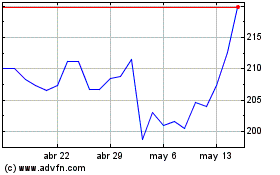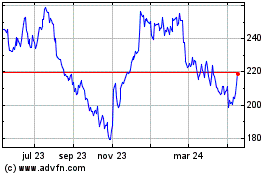Teleflex Incorporated (NYSE: TFX), a global leader in medical
technologies, today announced the presentation of new research
findings from the 2024 American Urological Association Annual
Meeting in San Antonio, TX, May 3 – 6, 2024, showcasing excellent
patient experience* with the Prostatic Urethral Lift (PUL) with the
UroLift™ System for benign prostatic hyperplasia (BPH).
This year’s research marks the first time results from two
randomized head-to-head trials were presented that reinforce the
UroLift™ System as the leading minimally invasive surgical therapy
(MIST) that can provide rapid relief and durable outcomes with
preservation of sexual function.**1-5
“These significant new randomized head-to-head studies and
real-world analyses demonstrate the UroLift™ System provides
distinctive patient experience* advantages, positioning it as an
early treatment option compared to medications for men whose
quality of life is impacted by oppressive BPH symptoms,” said
Jacqueline Welch, Vice President of Global Clinical and Scientific
Operations at Teleflex. “For over 10 years, Teleflex has advanced
BPH research through numerous trials involving the UroLift™ system
and now other contemporary treatments. Our continued investment and
focus on direct comparative research helps to facilitate more
informed discussions between clinicians and their patients about
treatment options.”
The following research presentations outlined the key findings
from the studies:
In the largest head-to-head randomized controlled trial
(RCT) study (IMPACT), early patient outcomes were studied among
UroLift™ PUL and Tamsulosin medication
subjects.1
- Preliminary data suggest that PUL with the UroLift™ system
offers better symptom relief, quality of life improvements and
patient satisfaction compared with alpha blockers within three
months following the initiation of treatment.1
- These findings could help to advance evidence-based shared
decision making.1
First head-to-head RCT study comparing UroLift™
System experience against Rezūm (CLEAR) showcases a
superior early patient experience* with the UroLift™ System (PUL)
compared with water vapor thermal therapy
(WVTT).2
- Patients undergoing PUL with the UroLift™ System experienced
more rapid symptom relief and quality of life improvements within
the first three months post-treatment.2
- Outcomes can aid healthcare providers and patients in gaining a
clearer understanding of the perioperative experience, facilitating
informed decisions regarding treatment options.2
A comprehensive analysis of post-surgery medication
usage over five years among patients treated with the
UroLift™ System, transurethral resection of the
prostate (TURP), and GreenLight™ photoselective vaporization of the
prostate (PVP).3
- Post-surgery medication usage is an important and relatively
unexplored facet of the BPH patient journey.3 The analysis found
that medication use was similar among the three procedures through
five years.3
- This may indicate that in a real-world setting, contrary to
expectations, not all TURP and PVP patients fully respond to the
benefits of the intervention.3
- Additionally, the medication rate following PUL with the
UroLift™ System was consistent with what was observed in the
L.I.F.T. pivotal study, further validating the integrity of the
trial.3
A real-world analysis of hospitalizations and emergency
department visits following surgical treatments for BPH showed
patients treated with UroLift™ PUL had the lowest unplanned
visits.4
- Real-world evidence serves as a litmus test for how minimally
invasive and surgical therapies for BPH perform outside the highly
managed settings of a clinical trial.4
- These events are often not reported in controlled trials but
should be considered when evaluating BPH treatment options.4
A review of the FDA’s Manufacturer and User Facility
Device Experience (MAUDE) database of medical device reports (MDRs)
showed UroLift™ PUL had the lowest rates of mild, moderate, and
severe complications year over
year.***5
- Once procedure volume is factored in, the UroLift™ System has
the lowest rates of mild, moderate, and severe postoperative
complications on a per case basis from 2019 to 2022 in the MAUDE
database.***5
- The yearly rates of mild, moderate and severe events are
significantly higher for invasive procedures like Aquablation® than
the minimally invasive surgical therapies analyzed.5
“The AUA guidelines acknowledge there are patients with LUTS
secondary to BPH who do not respond favorably to medicine and
recommend reevaluations within a reasonable period after the
initiation of treatment. The goal is for the provider and patient
to decide whether to continue, stop, or switch to another therapy
based on the symptomatic response of medication. In this context,
IMPACT is of interest as it allows us to observe the patient
journey after treatment with the UroLift™ System versus medication
with the option for a cross-over after reassessment,” said Claus
Roehrborn, MD, professor of urology at UT Southwestern Medical
Center and primary investigator on the study.† “Initial results
help us to understand not only efficacy comparisons, but also
distinctions in patient satisfaction and goal attainment, where
UroLift™ has an advantage. I commend Teleflex for facilitating a
groundbreaking trial that will serve urologists and patients for
years to come.”
In addition to the presentation of clinical data, Teleflex
showcased the new UroLift™ 2 System with Advanced Tissue Control
(ATC), which has recently received FDA clearance. The UroLift™ 2
ATC System offers physicians enhanced confidence, improved control
of obstructive tissue, and targeting accuracy through tissue
control wings and laser-etched needle markers designed to make
tissue manipulation and implant delivery more precise.6 A
streamlined delivery system, typically utilizing one handle per
procedure and individual implant cartridges, ensures increased
physician comfort and improves efficiency during the
procedure.6
BPH is a common condition in which the prostate enlarges as men
get older. As the prostate enlarges, it can press on and block the
urethra, causing bothersome urinary symptoms.7-8 The UroLift™
System is a minimally invasive treatment option for BPH that can
help men get off BPH medications and avoid major surgery, while
preserving sexual function.**9 It is the only leading enlarged
prostate procedure that does not require heating, cutting, or
destruction of prostate tissue.10-11
For more information about the UroLift™ System, visit
www.UroLift.com.
About the UroLift™ SystemThe
UroLift™ System is a minimally invasive treatment for lower urinary
tract symptoms due to benign prostatic hyperplasia (BPH). It is
indicated for the treatment of symptoms of an enlarged prostate up
to 100cc in men 45 years or older (50 years outside U.S.). The
UroLift™ permanent implants, which can be delivered during an
outpatient procedure,12 relieve prostate obstruction without
heating, cutting, destruction of, or removing prostate tissue. The
UroLift™ System can be used to treat a broad spectrum of anatomies,
including obstructive median lobe.13 It is the only leading BPH
procedure shown to not cause new onset, sustained erectile or
ejaculatory dysfunction.**11,14 The 5-year L.I.F.T. study results
demonstrate UroLift™ System durability with a surgical retreatment
rate of about 2-3% per year and 13.6% total over 5 years.9 Most
common side effects are temporary and can include hematuria,
dysuria, micturition urgency, pelvic pain, and urge incontinence.10
Rare side effects, including bleeding and infection, may lead to a
serious outcome and may require intervention. Individual results
may vary. The prostatic urethral lift procedure (using the UroLift™
System) is recommended for the treatment of BPH in both the 2023
American Urological Association and 2024 European Association of
Urology clinical guidelines. More than 475,000 men have been
treated with the UroLift™ System in select markets worldwide.15
Learn more at www.UroLift.com.
Caution: Federal (USA) law restricts this device to sale by or
on the order of a physician.
About Teleflex IncorporatedAs a global provider
of medical technologies, Teleflex is driven by our purpose to
improve the health and quality of people’s lives. Through our
vision to become the most trusted partner in healthcare, we offer a
diverse portfolio with solutions in the therapy areas of
anesthesia, emergency medicine, interventional cardiology and
radiology, surgical, vascular access, and urology. We believe that
the potential of great people, purpose driven innovation, and
world-class products can shape the future direction of
healthcare.
Teleflex is the home of Arrow™, Barrigel™, Deknatel™, QuikClot™,
LMA™, Pilling™, Rüsch™, UroLift™ and Weck™ – trusted brands united
by a common sense of purpose.
At Teleflex, we are empowering the future of healthcare. For
more information, please visit teleflex.com.
References:* Symptom relief and quality of life
improvement following treatment
**No instances of new, sustained erectile or ejaculatory
dysfunction in the L.I.F.T. pivotal study
*** While the MAUDE Database is a powerful resource, it is
subject to certain limitations. These include the potential for
underreporting of adverse events and the variability in the quality
and consistency of the information reported. MAUDE data does not
represent all known safety information for a reported medical
device and should be interpreted in the context of other available
information when making device-related or treatment decisions.
†Claus Roehrborn is a paid consultant of Teleflex.
- Roehrborn, et al, AUA 2024. Preliminary RCT Analysis of
Minimally Invasive Surgery vs. Medication in the Initial Treatment
of BPH-Associated LUTS. AUA Study sponsored by Teleflex
Incorporated or its affiliates
- Roehrborn, et al, AUA 2024. The Early Patient Experience
Following Treatment With PUL and WVTT, Two Contemporary MISTs for
BPH: Preliminary Results From the CLEAR Study. AUA Study sponsored
by Teleflex Incorporated or its affiliates
- Kaplan, et al, AUA 2024. A US Healthcare Claims Analysis
Reveals Post-surgery Medication Use Through 5 Years Is Similar
Between PUL, TURP, and GreenLight. AUA Study sponsored by Teleflex
Incorporated or its affiliates
- Kaplan, Prostate Cancer Prostatic Dis 2023
- Shinghal R, Ashley M, Eure G, AUA 2024. Total Procedural
Context is Crucial in Understanding BPH Treatment Device Safety in
the FDA’s MAUDE Database. (Manuscript in preparation)
- Data on file
- Rosenberg, Int J Clin Pract 2007
- Vuichoud, Can J Urol 2015
- Roehrborn, Can J Urol 2017
- Roehrborn, J Urol 2013
- AUA BPH Guidelines 2003, 2020
- Shore, Can J Urol 2014
- Rukstalis, Prostate Cancer and Prostatic Dis 2018
- McVary, Urology 2019
- Management estimate based on product sales as of January 2024.
Data on file Teleflex Interventional Urology.
Forward-Looking StatementsAny statements
contained in this press release that do not describe historical
facts may constitute forward-looking statements. Any
forward-looking statements contained herein are based on our
management’s current beliefs and expectations, but are subject to a
number of risks, uncertainties and changes in circumstances, which
may cause actual results or company actions to differ materially
from what is expressed or implied by these statements. These risks
and uncertainties are identified and described in more detail in
our filings with the Securities and Exchange Commission, including
our Annual Report on Form 10-K.
Teleflex, the Teleflex logo, Arrow, Deknatel, LMA, Pilling,
QuikClot, Rüsch, UroLift, and Weck, list all Teleflex-owned
trademarks in alphabetical order] are trademarks or registered
trademarks of Teleflex Incorporated or its affiliates, in the U.S.
and/or other countries. © 2024 Teleflex Incorporated. All rights
reserved.
Contacts:TeleflexLawrence KeuschVice President,
Investor Relations and Strategy
Developmentinvestor.relations@teleflex.com610-948-2836
Media Contact:Glenn SilverPartner National Media Relations
Specialistglenn.silver@finnpartners.com 646-871-8485
Teleflex (NYSE:TFX)
Gráfica de Acción Histórica
De Oct 2024 a Nov 2024

Teleflex (NYSE:TFX)
Gráfica de Acción Histórica
De Nov 2023 a Nov 2024




